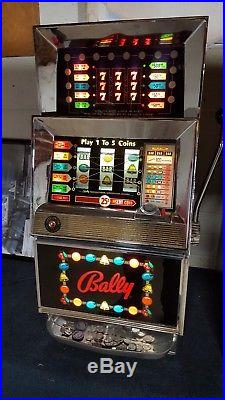Akafuji Slot: JACKPOT LIVE★Triple Double Diamond Slot Handpay on Free Play! San Manuel Casino, Akafuji slot https://www.
Most people look at the vast array of casino slot machines and assume they are all alike. They see a handle, a coin slot, flashing lights and figure one is as good as another. However, in making this assumption, they fail to see a lot of valuable information to help determine if they should play a particular slot machine.
Surprisingly perhaps, machines aren't all the same. The best way to separate one from another is to learn how to “read” a machine by looking at the payout schedule on the front. Let’s see what information can be found on a typical slot machine.
Casinos here in the U.S. and abroad keep several types of slot machines in play at any given time. A few you'll most often see:
Multiplier: This machine has a payout for a certain symbol and the number of coins played multiplies it. If the machine pays 5 coins for three lemons when you play one coin, it would pay 10 for the second coin and 15 for three coins played. This machine does not penalize you for not playing maximum coins. If you plan to play only one coin at a time, this is the type of machine you should look for.
Bonus Multiplier: This machine operates like the multiplier but offers a bonus when you play maximum coins and hit the jackpot. Three 7’s may pay 1,000 for one coin, 2,000 for two coins and 10,000 for maximum coins. The central question is whether the bonus is worth playing the extra coin.

Multiple Payline: These machines have more than one line of play. Each coin activates a particular line. If you hit a winner on a line that is not activated, you will not receive anything. The older machines used to have three lines but the newer video slots can have up to nine lines.
Buy-a-Pay: These are the most misunderstood machines in the casino. Each coin activates a different payout. You need the maximum coins to receive the largest jackpot.

One example is the Sizzlin' 7s machines. This machine will pay on cherries, bars, and sevens. The sevens pay 1,000 coins. If you play one coin you collect only on the cherries. If you play two coins you collect on cherries and bars.
Three coins are required to collect on the Sizzlin' 7s. If you hit the jackpot with one coin in you will not win anything -- do not play this machine under any circumstances unless you are playing the maximum coins.
Progressive Slots: The progressive slots take a certain percentage of the money played and add it to a pool for the top jackpot.
First and foremost, It is never wise to play a progressive machine with less than the maximum coins -- stories abound of people losing out on lesser progressive jackpots because of short coin play.
Some casinos link machines together within their own facility to offer mini-progressive jackpots.
Megabucks and Quarter Mania are examples of machines from several casinos linked together to offer 'life-changing jackpots'. It's important to keep in mind that payback percentage on lesser wins is lowered to allow for these jackpots.
All of the information you need is posted on the front of each slot machine. Before sitting down to play, taking a minute to “read” the machine will help make you more knowledgeable in determining which machines may be best suited for you.
Until next time, remember:
'Luck comes and goes...Knowledge Stays Forever.'
If you had put in one or three coins the outcome would likely have been entirely different. The machine is constantly drawing random numbers and the numbers that were drawn at the moment you spin the reels determine the outcome. So, if you had played fewer or more coins you would have spun the reels at a different moment and thus the outcome would have been different.
Congratulations also on the new gig with Casino Player, I enjoy it the site and your occasional posts on bj21. As someone who works in the industry, admittedly not slots, I was under the impression that the more recent slots have the RNG stop the moment the first coin drops, so it really doesn't matter if you play 1,2, or 3 coins -- the symbols will line up the same. Have I been misinformed? According to your previous answer I apparently have. Keep up the good work and I'll stay in touch, thanks and best wishes.
Thanks for the kind words Dave. You're right that it was the money that finally made me accept the banners. It is my understanding that when the player presses the button to spin the reels the random numbers are drawn at that instant, which determine where the reels stop, and ultimately what you win. The number of coins bet does not matter.
Thanks for the compliment. The outcome of the game is determined when the player initiates the spin. The game is constantly drawing random numbers, even when not played. The random numbers chosen at the moment the button is pressed to spin the reels determine where the reels stop, which determines what the player wins. So, if the player bet three coins he would have pressed the button at a different moment, causing a different outcome.
No, that information won’t help you at all. Your odds are always the same on every spin, regardless of the counters.
To answer your question I asked a well connected gaming consultant and he said Nevada regulations state that one stop on a reel can not be weighted more than six times more than either stop next to it. So if a jackpot symbol were weighted by 1 and both bordering blanks were weighted by 6 then there would be 12 near misses for every one time the reel stopped on the jackpot symbol. This would be the maximum allowed near miss effect. My own results detailed in my slot machine appendix 1 back up this theory well. The red double seven was the highest paying symbol and I saw the blanks above and below it about 5 to 6 times as often:
Double Strike Actual Results
| Symbol | Reel 1 | Reel 2 | Reel 3 |
| Blank | 250 | 248 | 291 |
| Double red 7 | 52 | 51 | 55 |
| Blank | 259 | 292 | 262 |
The same source said that New Jersey and Mississippi likely have adopted the Nevada regulations.
My understanding is that the person who is pressing the buttons gets the money. I asked Brian, who helped with the last question, about this. Here is what he wrote, which I agree with.
In the scenario described, the person who put in the money and pressed the buttons would receive the jackpot.
What I find interesting about this question is the paradox that in all likelihood, the jackpot never would have occurred without this chance encounter.
As you know, the random number generator in the slot machine is continuously working even when the machine is not in play. So even though one patron feels cheated, their run-in ultimately led to pressing the spin button at that exact millisecond when the RNG was on the winning combination. So, if one patron had acquiesced, there is never a jackpot to fight over.
Thanks for helping in the fight against betting systems. First let me say that I have never worked for a major slot machine company and don’t have direct knowledge of this. However, I know many people in the industry and those I trust pretty much are in agreement on this topic.
That said, it is my understanding that in all forms of electronic games, including video slots, video poker, and video keno, the outcome is usually determined the moment you make your decision. Meanwhile the possible outcomes are constantly being shuffled, thousands of times a second. I can’t speak for every slot machine but I believe that with the major U.S. slot makers the outcome is not predestined but depends on the exact microsecond you press the button to make your play.
Super 8 Line Slot Machine
Slot Machine Pick Up Lines Near Me
Thanks for the kind words. Scratch cards and pull tabs can indeed be printed in batches. These batches will have a specified number for each win, and the return of the overall batch will be exactly as the maker intended. In some jurisdictions, where only pull tabs are legal, the outcome can be displayed to the player on a video monitor, in the form of a slot or video poker machine. However, in Nevada, that is not how slots work. Each play is completely independent of the past. A machine programmed to average a 97% return, could indeed pay under 95% or over 99% over a year, especially if not heavily played.